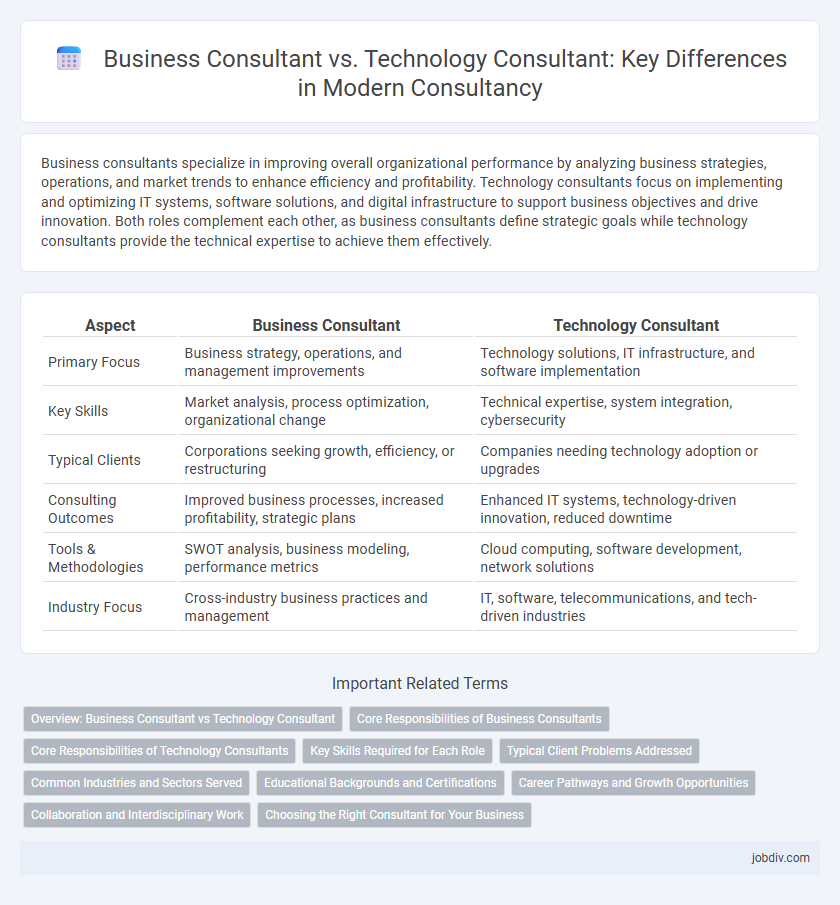Business consultants specialize in improving overall organizational performance by analyzing business strategies, operations, and market trends to enhance efficiency and profitability. Technology consultants focus on implementing and optimizing IT systems, software solutions, and digital infrastructure to support business objectives and drive innovation. Both roles complement each other, as business consultants define strategic goals while technology consultants provide the technical expertise to achieve them effectively.
Table of Comparison
| Aspect | Business Consultant | Technology Consultant |
|---|---|---|
| Primary Focus | Business strategy, operations, and management improvements | Technology solutions, IT infrastructure, and software implementation |
| Key Skills | Market analysis, process optimization, organizational change | Technical expertise, system integration, cybersecurity |
| Typical Clients | Corporations seeking growth, efficiency, or restructuring | Companies needing technology adoption or upgrades |
| Consulting Outcomes | Improved business processes, increased profitability, strategic plans | Enhanced IT systems, technology-driven innovation, reduced downtime |
| Tools & Methodologies | SWOT analysis, business modeling, performance metrics | Cloud computing, software development, network solutions |
| Industry Focus | Cross-industry business practices and management | IT, software, telecommunications, and tech-driven industries |
Overview: Business Consultant vs Technology Consultant
Business consultants focus on improving organizational performance through strategic planning, process optimization, and change management, leveraging industry knowledge to drive business growth. Technology consultants specialize in implementing IT solutions, digital transformation, and infrastructure optimization to enhance operational efficiency and support technology-driven innovation. Both roles require analytical skills and problem-solving but differ in their primary focus areas--business strategy versus technological advancement.
Core Responsibilities of Business Consultants
Business consultants analyze organizational processes, identify inefficiencies, and develop strategic plans to improve overall business performance and profitability. They specialize in areas such as operational optimization, market analysis, financial planning, and change management to drive sustainable growth. Their primary role is to align business objectives with practical solutions, ensuring that organizational goals are met through effective management practices and stakeholder collaboration.
Core Responsibilities of Technology Consultants
Technology consultants specialize in analyzing and implementing IT solutions to improve business operations, focusing on system integration, software development, and cybersecurity measures. They assess organizational technology needs, develop strategies for digital transformation, and optimize IT infrastructure to enhance efficiency and scalability. Their core responsibilities also include managing technology projects, ensuring compliance with industry standards, and advising on emerging technologies to maintain competitive advantage.
Key Skills Required for Each Role
Business consultants require strong analytical skills, strategic thinking, and expertise in market research to drive organizational growth and improve processes. Technology consultants must have proficiency in IT infrastructure, software development, and cybersecurity to implement and manage technology solutions effectively. Both roles benefit from excellent communication skills and the ability to adapt to diverse industry challenges.
Typical Client Problems Addressed
Business consultants typically address challenges related to organizational strategy, operational efficiency, and market positioning, helping clients improve profitability and streamline processes. Technology consultants focus on issues such as IT infrastructure optimization, software implementation, and digital transformation to enhance technological capabilities. Both roles aim to align solutions with client goals, but business consultants prioritize business growth while technology consultants emphasize technological innovation.
Common Industries and Sectors Served
Business consultants primarily serve industries such as finance, healthcare, retail, and manufacturing, focusing on strategy, operations, and organizational effectiveness. Technology consultants are commonly engaged by sectors like information technology, telecommunications, automotive, and energy, delivering expertise in software implementation, digital transformation, and IT infrastructure. Both consultant types often collaborate across sectors including government, education, and consumer services to drive business innovation and technology adoption.
Educational Backgrounds and Certifications
Business consultants typically hold degrees in business administration, finance, or economics, often enhanced by certifications such as PMP, Six Sigma, or MBA credentials to strengthen strategic and operational expertise. Technology consultants usually possess educational backgrounds in computer science, information technology, or engineering, complemented by certifications like CISSP, AWS Certified Solutions Architect, or Microsoft Certified Professional to validate their technical skills. Both roles require continuous professional development, but business consultants focus more on management and organizational theories while technology consultants emphasize technical proficiency and system implementation.
Career Pathways and Growth Opportunities
Business consultants typically focus on strategic planning, organizational development, and financial analysis, offering clear career pathways into management roles, corporate leadership, or entrepreneurial ventures. Technology consultants specialize in IT systems, software implementation, and digital transformation, enabling growth opportunities in emerging tech fields like cybersecurity, cloud computing, and data analytics. Both career paths demand continuous skill development but diverge significantly in industry focus and long-term advancement prospects.
Collaboration and Interdisciplinary Work
Business consultants and technology consultants collaborate by combining strategic market insights with technical expertise to drive innovative solutions and optimize organizational performance. This interdisciplinary approach enhances decision-making, streamlines processes, and aligns technology implementation with business goals. Effective collaboration between these consultants fosters agile transformations and competitive advantage in rapidly evolving markets.
Choosing the Right Consultant for Your Business
Choosing the right consultant for your business hinges on understanding the distinct expertise of business consultants and technology consultants. Business consultants specialize in enhancing organizational strategy, operations, and market positioning, while technology consultants focus on implementing IT solutions, managing digital transformation, and optimizing technological infrastructure. Aligning your business goals with the consultant's core competencies ensures targeted problem-solving and maximized return on investment.
Business Consultant vs Technology Consultant Infographic

 jobdiv.com
jobdiv.com